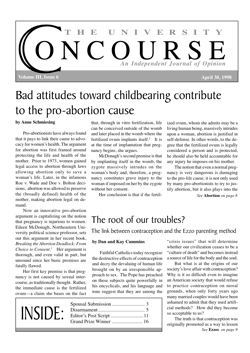What if Shakspere wasn’t Shakespeare?
by Kathleen van Schaijik
Last month my parents sent me a copy of Joseph Sobran’s new book, Alias Shakespeare, defending the thesis that the real author of Shakespeare’s works was Edward de Vere, the seventeenth Earl of Oxford. I read it in practically one sitting. It was riveting, and (to my mind at least) completely convincing—more than convincing. He made the accepted theory look ludicrous. The reader is left amazed that so pitifully few and slender pieces of “evidence” in favor of the authorship of the actor William Shakspere could, beaverdam-like, have held back such an overwhelming flood of probabilities in favor of Oxford for over three hundred years.
Part of the explanation, according to Sobran, is that Shakespearean scholarship, almost from the outset, has been bound up with the anti-aristocracy, egalitarian ideology of the post-enlightenment period. (We were so enamored of the idea that a regular, middle class guy could have been the greatest literary genius of all time, that we failed to investigate whether it was really the case.) Another reason has been the unwillingness of the public to admit the likelihood that the greatest sonnets in the English language were inspired by a homosexual passion.
Stated so starkly in abstract thesis-form like that, the idea is no doubt a stunning blow to many devotees of Shakespeare, but I for one find it consoling in the concrete.
As a student of philosophy with a particular interest in the nature of love (my senior thesis at FUS was on the nature of love in Shakespeare’s Othello, and I am currently writing a book on Christian courtship) I have found Shakespeare’s plays an endlessly rich source of wisdom and insight. The sonnets, on the other hand, have been disappointing. More than once, looking for inspiration, or for help in expressing some elusive aspect of the mystery of conjugal love, I have turned to his sonnets, and come away virtually empty-handed (feeling, I might add, a little confused and conflicted about it. Was I missing something? This was Shakespeare.)
The experience is completely different reading, for instance, Elizabeth Barrett Browning’s Sonnets from the Portuguese. I can’t judge the relative literary merit of the two sets of poems—I remain perfectly ready to believe the experts who say Shakespeare’s are superior—but, for someone “looking for love,” every one of EBB’s drips gold. All the truest aspects of a pure romance are beautifully and marvelously revealed in them: the life-giving, salvific power of love; how it ennobles the soul; the bliss it engenders; its rootedness in and directedness toward the deepest selfhood of the person; its bodily expression; its goodness; its living reciprocity; the unity it creates between the lovers; its gift character; the joy and awe and humility and gratitude and courage it inspires in the beloved, and so on. Consider just these few lines from number VIII:
“What can I give thee back, O liberal
And princely giver, who hast brought the gold
And purple of thine heart, unstained, untold,
And laid them on the outside of the wall
For such as I to take or leave withal,
In unexpected largesse?...”
The major themes of Shakespeare’s sonnets are completely different, and less inspiring. One is the physical beauty of his “lovely boy” and the regretableness of its inevitable passing. Another is the repeated unfaithfulness of both the poet and his beloved. The sonnets speak much of jealousy, doubt, betrayal, self-loathing, torment, deception and bitter disappointment. Here are a few lines from number XCV:
“How sweet and lovely dost thou make the shame
Which, like a canker in the fragrant rose,
Doth spot the beauty of thy budding name!
O, in what sweets dost thou thy sins inclose!
....O, what a mansion have those vices got
Which for their habitation chose out thee…”
I do not mean to suggest (never mind contend) that Shakespeare’s sonnets are not surpassingly great poems. I only say a Christian need not be depressed or scandalized if it turns out to be true that they were inspired mainly by a disordered, same-sex passion.


